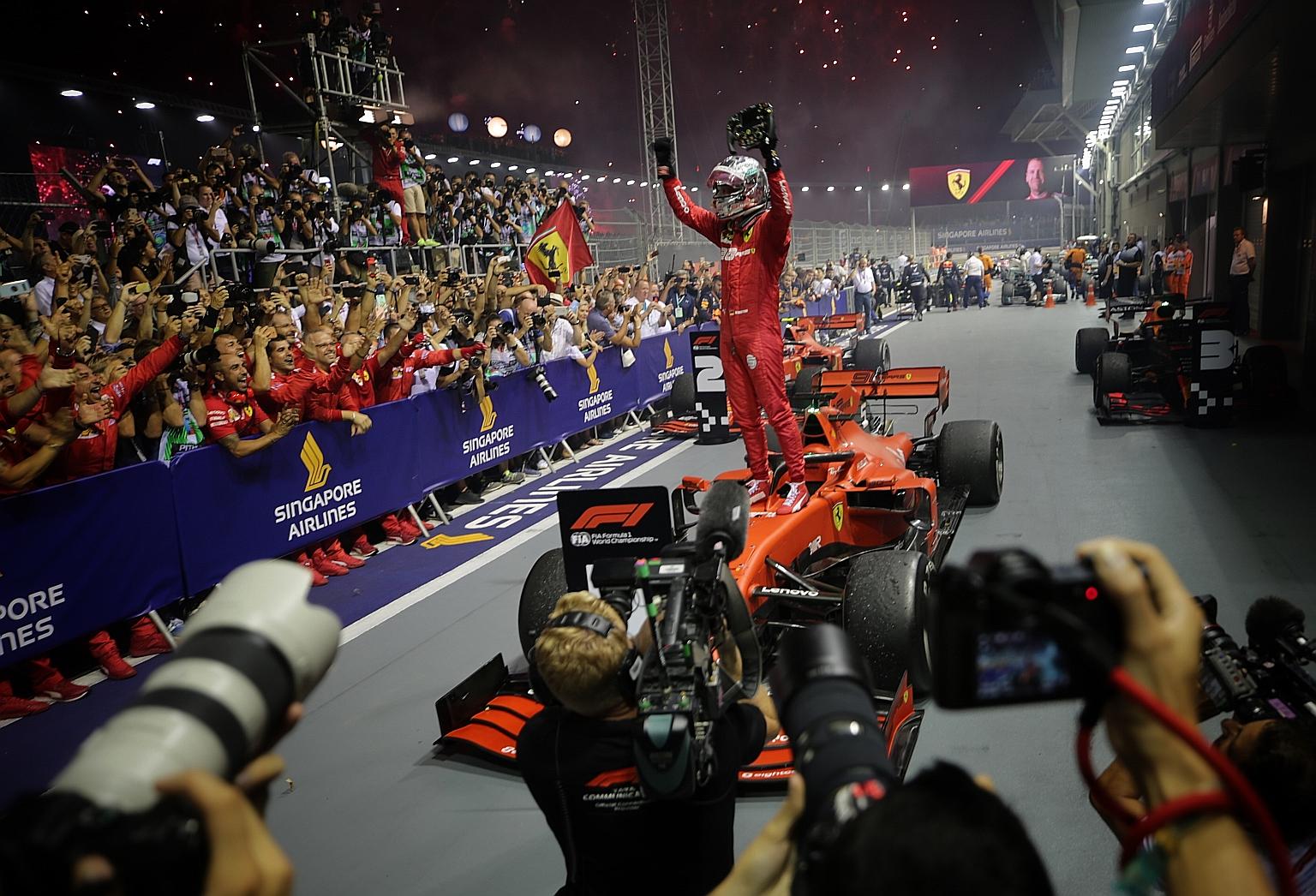COVID-19 SPECIAL
What next for SIA and Singapore Grand Prix?
Sign up now: Get the biggest sports news in your inbox

Last year's Singapore Grand Prix, won by Ferrari's Sebastian Vettel, drew a three-day total of 268,000 spectators. The fate of this year's race is anyone's guess, with the coronavirus pandemic delaying the start to the F1 season.
ST PHOTO: KELVIN CHNG
There are still five months to the Singapore Airlines Singapore Grand Prix but there is already doubt about its future, with the coronavirus pandemic continuing to wreak havoc around the world.
This year's first eight Formula One races have been either postponed or cancelled, with the Canadian Grand Prix on June 14 the de facto season opener now, though its status and the rest of the race calendar remains highly uncertain.
For the Singapore race, scheduled for Sept 20 and the eighth stop on the revised and shortened line-up, it is a potential double whammy given the troubles of its title sponsor.
SIA, much like the rest of the aviation industry, has been pummelled by the Covid-19 outbreak.
The Republic's national carrier, which last week was thrown a $15 billion lifeline backed by majority owner Temasek, is in the midst of cost-cutting measures including wage reductions and voluntary no-pay leave for most SIA staff.
The airline has backed the Singapore race since 2014 and last year extended its title sponsorship until 2021, the same year the country's hosting rights deal with F1 ends.
SIA's partnership for the first two years was believed to be worth between $10 million and $15 million annually, and reportedly $10 million a year for the next two years. The value of the 2018-2019 term, as well as the present one, is not known.
Asked about the company's future approach towards sports sponsorship and if it will look to renegotiate the existing contract, an SIA spokesman said: "We do not comment on speculation, and we continue to monitor the situation closely."
Race promoter Singapore GP also declined to discuss commercial contractual specifics and told The Straits Times there are currently no plans to cancel or postpone the event but as the situation is dynamic, it will "continue to monitor the Covid-19 situation closely, and update the public on any developments as soon as possible".
For associate professor Prem Shamdasani from the National University of Singapore Business School's marketing department, it is obvious where SIA's priorities lie.
He said: "Singapore Airlines has got to take care of business first in terms of ensuring that it remains lean during the next few critical months and subsequently, focus on resuming its operations internationally when things improve...
"While the Singapore Grand Prix has been one of the iconic events that has put Singapore on the global tourism map in the past, its return on marketing investment may be subject to diminishing and uncertain returns not only for the Singapore economy but for title sponsor SIA as well."
Associate Professor Sharon Ng, head of the marketing division at Nanyang Technological University, shared a similar view. She said: "This (cost cutting) will definitely affect SIA's ability to honour its contract given the current financial situation. It is unclear how this will play out in terms of legal obligations though.
"If the race does not go on in September, that will be fine for SIA. If it does, then both parties will need to work out a reasonable arrangement."
Global sports sponsorship was projected to hit US$48.4 billion (S$69.5 billion) this year, noted marketing intelligence firm Warc, though this was before the coronavirus contagion swept the world.
The landscape moving forward will be very different, said Singapore Management University associate professor of marketing Hannah Chang.
"Live sports are at an unprecedented standstill," she said. "There is too much uncertainty regarding when the pandemic will end and its influence on the economy. As such, it is likely that companies will hold off on sports sponsorship until the current situation resolves and life returns to steady state.
"Going forward, sports sponsorship will not go away. The real question is, when would it be feasible for brands and organisations to consider this strategy again?"
The first 11 editions (2008-2018) of the night race brought in over $1.4 billion in tourism receipts and more than 490,000 unique international visitors.
In 2017, then Minister for Trade and Industry (Industry) S. Iswaran said the cost of hosting the race had decreased by about $15 million to $135 million a year.
Last year's race, won by Ferrari's Sebastian Vettel, drew a three-day total of 268,000 spectators - the second-highest after the 300,000 total that thronged the Marina Bay Street Circuit in 2008.
F1 held 18 races that year, a total its chairman and chief executive Chase Carey said last month would be the best-case scenario for this campaign given the disruptions.
Carey said he expected the season, which was due to finish in Abu Dhabi on Nov 29, to run into December "with the actual sequence and schedule dates for races differing significantly from our original 2020 calendar".
What this means for the Singapore race, presently sandwiched between the Italian GP (Sept 6) and Russian GP (Sept 27), is unclear.
A Singapore GP spokesman said: "As with any major decisions regarding the race, we will work with the Government, stakeholders and Formula One before making any collective decision closer to the event."


